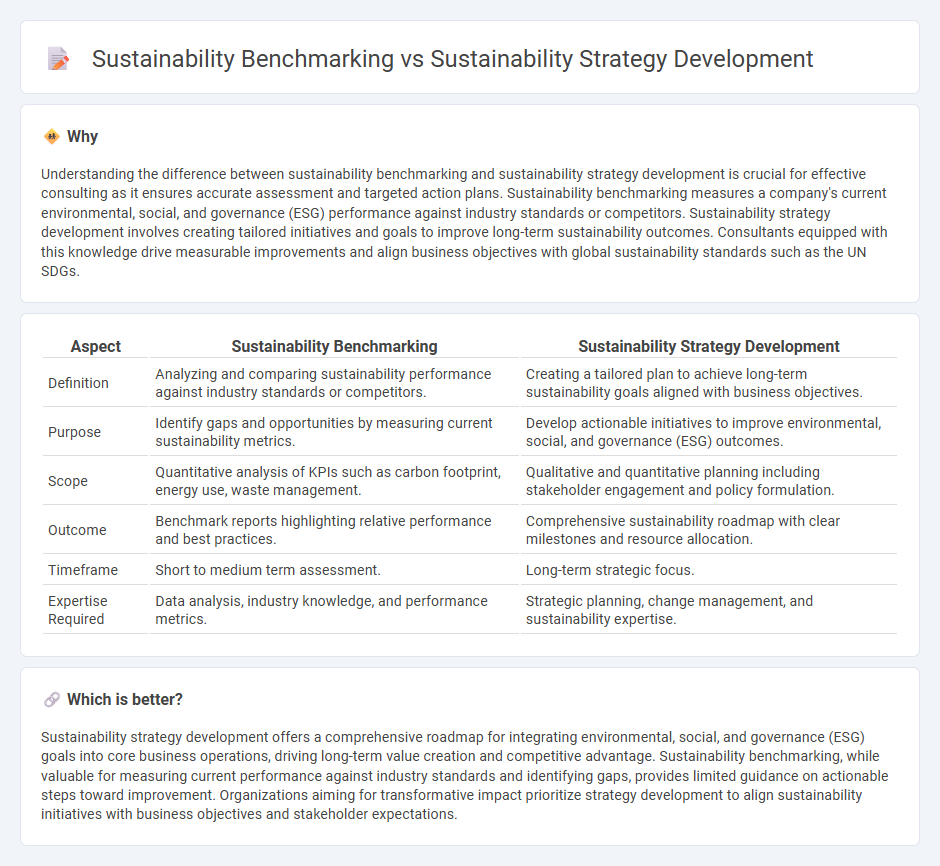
Sustainability benchmarking evaluates an organization's performance against industry standards, highlighting areas for improvement through measurable metrics such as carbon footprint and resource efficiency. Sustainability strategy development involves creating tailored roadmaps that align business goals with environmental and social responsibility, integrating innovation, risk management, and stakeholder engagement. Explore how combining benchmarking insights with strategic planning drives impactful sustainability outcomes.
Why it is important
Understanding the difference between sustainability benchmarking and sustainability strategy development is crucial for effective consulting as it ensures accurate assessment and targeted action plans. Sustainability benchmarking measures a company's current environmental, social, and governance (ESG) performance against industry standards or competitors. Sustainability strategy development involves creating tailored initiatives and goals to improve long-term sustainability outcomes. Consultants equipped with this knowledge drive measurable improvements and align business objectives with global sustainability standards such as the UN SDGs.
Comparison Table
| Aspect | Sustainability Benchmarking | Sustainability Strategy Development |
|---|---|---|
| Definition | Analyzing and comparing sustainability performance against industry standards or competitors. | Creating a tailored plan to achieve long-term sustainability goals aligned with business objectives. |
| Purpose | Identify gaps and opportunities by measuring current sustainability metrics. | Develop actionable initiatives to improve environmental, social, and governance (ESG) outcomes. |
| Scope | Quantitative analysis of KPIs such as carbon footprint, energy use, waste management. | Qualitative and quantitative planning including stakeholder engagement and policy formulation. |
| Outcome | Benchmark reports highlighting relative performance and best practices. | Comprehensive sustainability roadmap with clear milestones and resource allocation. |
| Timeframe | Short to medium term assessment. | Long-term strategic focus. |
| Expertise Required | Data analysis, industry knowledge, and performance metrics. | Strategic planning, change management, and sustainability expertise. |
Which is better?
Sustainability strategy development offers a comprehensive roadmap for integrating environmental, social, and governance (ESG) goals into core business operations, driving long-term value creation and competitive advantage. Sustainability benchmarking, while valuable for measuring current performance against industry standards and identifying gaps, provides limited guidance on actionable steps toward improvement. Organizations aiming for transformative impact prioritize strategy development to align sustainability initiatives with business objectives and stakeholder expectations.
Connection
Sustainability benchmarking provides a critical foundation for sustainability strategy development by evaluating current environmental, social, and governance (ESG) performance against industry standards and competitors. This data-driven benchmarking identifies key areas for improvement and sets measurable targets that guide strategic planning and resource allocation. Integrating benchmarking results into strategy development ensures that sustainability initiatives are both actionable and aligned with broader corporate goals for long-term value creation.
Key Terms
**Sustainability strategy development:**
Sustainability strategy development involves creating a comprehensive plan that integrates environmental, social, and governance (ESG) goals into an organization's core operations to drive long-term value and mitigate risks. This process emphasizes stakeholder engagement, impact assessment, and aligning sustainability initiatives with business objectives to foster innovation and regulatory compliance. Explore how tailored sustainability strategies can transform your organization's environmental and social performance.
Materiality assessment
Sustainability strategy development involves conducting a thorough materiality assessment to identify and prioritize environmental, social, and governance (ESG) issues most relevant to the business and its stakeholders. Sustainability benchmarking compares these material topics against industry standards and competitors to gauge performance and identify improvement opportunities. Explore detailed insights on how materiality assessments drive effective sustainability strategies and benchmarking processes.
Stakeholder engagement
Sustainability strategy development emphasizes aligning organizational goals with stakeholder expectations through active engagement and collaborative decision-making. Sustainability benchmarking involves assessing a company's performance against industry standards or competitors, providing stakeholders with transparent data on environmental and social impact. Explore how integrating both approaches enhances comprehensive stakeholder engagement and drives effective sustainability outcomes.
Source and External Links
How to Create a Sustainability Strategy for Your Business - APLANET - Outlines a step-by-step guide, emphasizing materiality analysis, clear vision and objectives, measurable actions, accountability, progress monitoring, and transparent communication for effective sustainability strategy development.
Sustainability Strategy: Simplified - Stresses the need for a company to start with its vision, mission, and values, then rigorously assess material issues, set clear priorities, integrate these into a framework with targets and KPIs, and engage stakeholders for resilient, value-creating strategy.
7 Steps for Creating a Sustainability Strategy - Meraki Go Blog - Details a process that includes building sustainability knowledge, forming a dedicated team, assessing business needs, crafting a green mission statement, and developing a targeted, measurable, and prioritized action plan.
 dowidth.com
dowidth.com